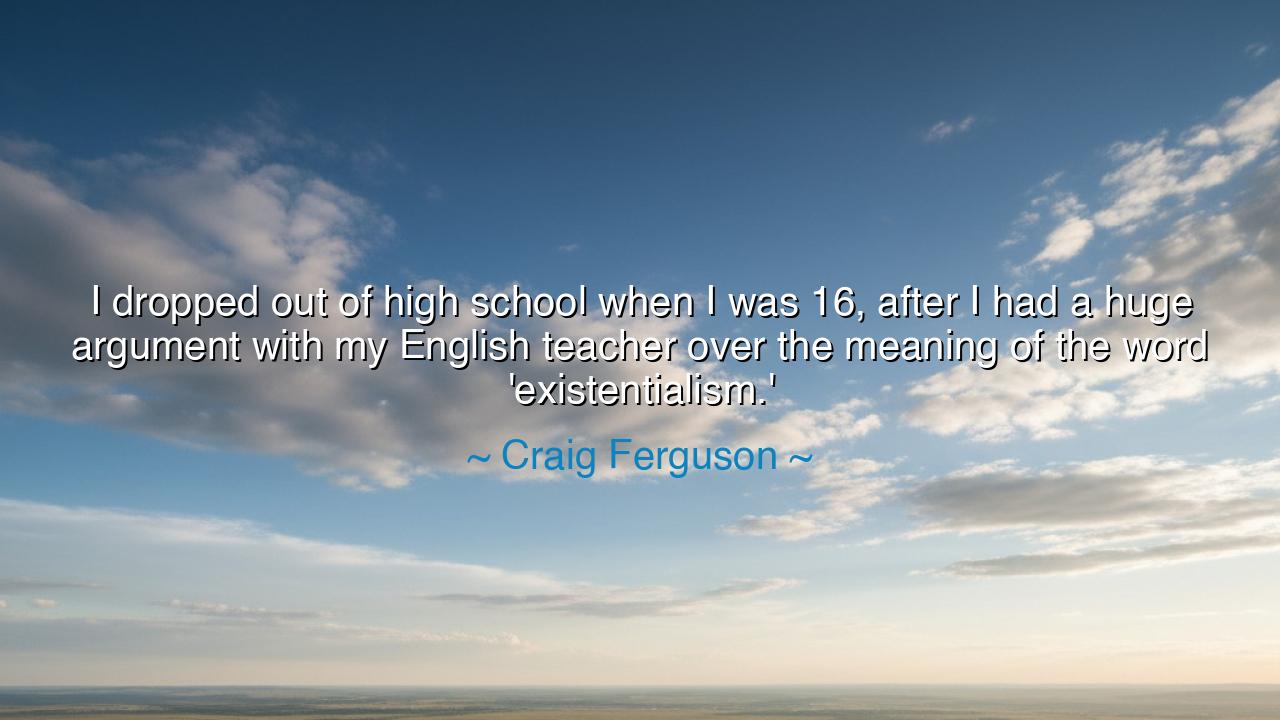
I dropped out of high school when I was 16, after I had a huge
I dropped out of high school when I was 16, after I had a huge argument with my English teacher over the meaning of the word 'existentialism.'






Hear now the words of Craig Ferguson, spoken with the wit of a jester but carrying the weight of hidden truth: “I dropped out of high school when I was sixteen, after I had a huge argument with my English teacher over the meaning of the word existentialism.” At first, these words may seem as jest, the recollection of a comedian recounting youthful defiance. Yet beneath their laughter lies a lesson of the ancients—that the hunger for meaning can drive a soul beyond the walls of convention, and that even a quarrel over a word may awaken the restless search for truth.
For what is existentialism but the cry of the human spirit, asking, “What is the meaning of my existence?” To argue over this word is not a small thing, for it is to wrestle with the essence of life itself. Ferguson, still a boy, clashed with his teacher, for his heart was not content with the mere academic answer. He longed for something deeper, more alive, more real. His choice to drop out was not merely rebellion, but the instinctive act of a soul unwilling to confine its questions within the narrow walls of schooling.
So too have others throughout history walked away from institutions in pursuit of higher truths. Consider Siddhartha Gautama, who abandoned the palace of his father to seek enlightenment beneath the Bodhi tree. Or think of young Leonardo da Vinci, who did not learn by textbooks, but by watching the flight of birds and the motion of water. These men, like Ferguson in his own way, saw that knowledge must be lived, not merely recited. And sometimes, the deepest truths arise not from agreement with teachers, but from argument with them.
Yet beware, O seekers: Ferguson’s tale also teaches humility. To drop out is not always to rise higher, for many who flee the classroom find only wandering and regret. What matters is not the rebellion itself, but the purpose behind it. To leave the safety of the known must be to pursue the unknown with courage, not to drift in aimless neglect. Ferguson’s journey led him through struggle, failure, and reinvention, but in the end, he forged his craft and voice as one who had truly wrestled with existence. His quarrel with existentialism was not the end, but the beginning.
This truth reveals the paradox of youth: often the young see clearly what their elders forget—that the words of philosophy are not dry definitions, but living torches to light the path of being. To demand meaning at sixteen is not folly; it is the fire of the spirit refusing to be lulled by easy answers. Yet, one must also learn patience, for meaning is not found in a single argument or a single word, but in the long labor of a life lived with awareness.
What then is the lesson for you, children of tomorrow? It is this: do not fear to question, even to argue, when your soul demands it. But let your questioning be more than defiance—let it be the seed of growth. If you must walk away from one path, be sure it is because another has called you. Seek the meaning behind the words, not just the victory in the debate. For true existentialism is not the quarrel itself, but the choice to live deliberately, aware of your freedom and your responsibility.
Therefore, follow Ferguson’s example in spirit, but not in recklessness. Question your teachers, but also learn from them. Challenge authority, but do not cast aside wisdom. If you feel the fire of doubt, let it drive you not into despair, but into discovery. Remember always: the arguments of youth, though foolish in appearance, may conceal the first steps of a lifelong search. And so, from a quarrel over a word, may be born a life that teaches others to laugh, to think, and to live with courage.






AAdministratorAdministrator
Welcome, honored guests. Please leave a comment, we will respond soon